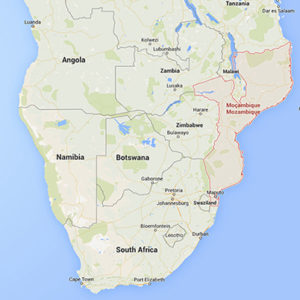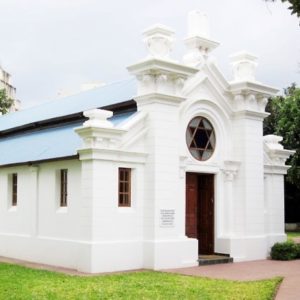 The first Jewish congregation was founded in Lourenço Marques in 1899, although Jews had been in the area since the 15th century. In 1926 they built a synagogue, but the community was never large enough to support a rabbi, it was led by the members. Mozambique was a sanctuary for Jews looking to escape Nazi Germany. Increasing numbers of refugees began to arrive in Lourenço Marques, which had been designated a neutral port. As a result, the Jewish population of the city swelled to around 500 people in 1942 and the Lourenço Marques Synagogue became a hub for aid efforts. Some of the country’s Jewish leaders assisted 40 families in Beira and 80 individuals in Maputo. However, most Jews left for South Africa after immigration restrictions were eased toward the end of the war. A decade-long armed struggle to secure Mozambique’s independence from Portugal was fought from 1964 to 1974.
The first Jewish congregation was founded in Lourenço Marques in 1899, although Jews had been in the area since the 15th century. In 1926 they built a synagogue, but the community was never large enough to support a rabbi, it was led by the members. Mozambique was a sanctuary for Jews looking to escape Nazi Germany. Increasing numbers of refugees began to arrive in Lourenço Marques, which had been designated a neutral port. As a result, the Jewish population of the city swelled to around 500 people in 1942 and the Lourenço Marques Synagogue became a hub for aid efforts. Some of the country’s Jewish leaders assisted 40 families in Beira and 80 individuals in Maputo. However, most Jews left for South Africa after immigration restrictions were eased toward the end of the war. A decade-long armed struggle to secure Mozambique’s independence from Portugal was fought from 1964 to 1974.
 After the country gained its independence in 1975 came civil war and, with it, the curtailment of freedom of religion. During the 15-year civil war, lasting from 1977 to 1992, a high percentage of Jews left Maputo. The synagogue was abandoned and the cemetery vandalised.
After the country gained its independence in 1975 came civil war and, with it, the curtailment of freedom of religion. During the 15-year civil war, lasting from 1977 to 1992, a high percentage of Jews left Maputo. The synagogue was abandoned and the cemetery vandalised.
The revitalization of the community began in the late 1980s with the aid of Alkis Macropolous and an Israeli named Peter Milic. By 2012, the synagogue and graveyard were restored. The challenges they face are those common to small communities: educating their children, finding a minyan when someone has Kaddish, and observing all the holidays. A lot of kosher food is available from South Africa. The Honen Dalim Synagogue in Maputo is the only functioning Jewish institution in Mozambique, which hosts multi-lingual services every Shabbat that incorporates Portuguese and English.
In 2018, Maputo’s Jewish community was about 70. A lot of kosher food is available in Maputo. While they’ll never be a massive community, the resilience of Mozambique’s Jewry is undeniable and the future looks bright for the community.